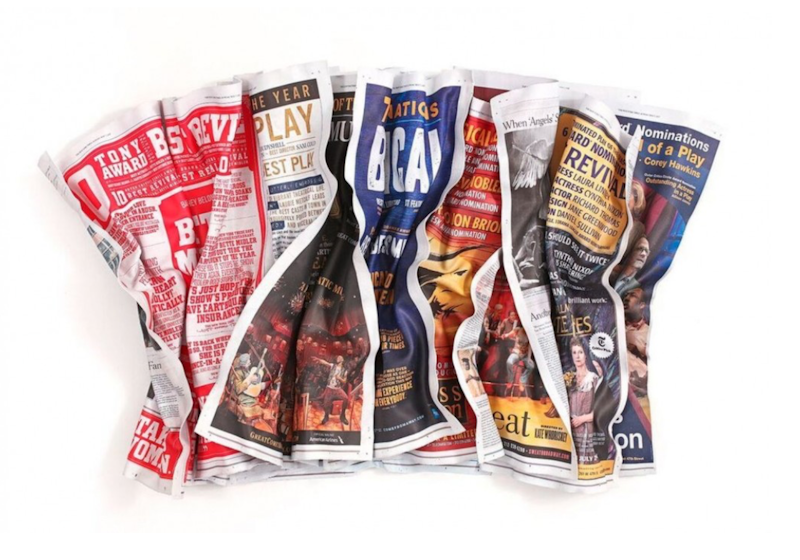I’m in an abusive relationship with The New York Times. The paper tried to murder me in 2018, yet I can’t stop reading it. I read it for the arts coverage, which is brilliant and makes conservative coverage of the arts look like the starving orphan it is.
A recent Sunday edition of the Times offered a selection of incisive and penetrating arts coverage. There was an essay by Blake Gopnik on the Supreme Court and the last 500 years of art. There was a review of the new Walter Mosley book. There was a fantastic essay in the magazine about “the new Black canon” of literature. As if that wasn’t enough—to say nothing of the book, dance, music and movie reviews—there was a beautiful piece by Adam Tendler. Tendler, a classical pianist, used the money from his father’s death to commission music pieces on the theme of “inheritance.” He wanted to create “a vessel through which I could connect to my elusive father, process my grief and reconcile with my past.”
Ben Shapiro reviewing the new Batman movie can’t compete with that. Neither is National Review devoting its culture section to “wokeness.” Most conservative arts writers are slumping political writers, or hacks who got their job through nepotism or the buddy system. The only outstanding arts coverage from the right is at The New Criterion, but that’s a monthly journal that doesn’t publish in the summer and avoids all popular culture. They also don’t do interviews and profiles.
The political coverage in the Times is pure Marxism. The opinion section of the edition I recently picked up features angry academics and activists defending the censorship of Roald Dahl, blasting the 1776 founding of America, and saying that Ron DeSantis is trying to shut down free speech. Boilerplate socialist nonsense. This is the same Times that tried to kill me in 2018. Criminals and opposition researchers tried to take out my high school friend Brett Kavanaugh when he was nominated for the Supreme Court. Their plan involved using extortion and witness-tampering to make me, a former drunk with a colorful last, the nominee and therefore take down Brett. It didn’t work and the right people are in jail. The Times reporters who participated are considered a disgrace.
Still, I couldn’t give up Sunday’s Times. One time shortly after the 2018 hurricane a friend saw me leaving the store with one tucked under my arm and stopped me. “Wait, the Times?” he said. “Are those the totalitarian assholes that tried to kill you?” They are. Seeing such communist propaganda so close to the arts sections brought to mind a line from the great film The Sweet Smell of Success—“I don’t like you, you’re like a cookie with arsenic.”
In the same Sunday Times from last week, David Brooks has a moving essay about the importance of art—how it touches us in a deeper place than politics. Going to a museum, a concert or reading a book to experience beauty transforms us in a way politics never can. “These experiences furnish us with a kind of emotional knowledge,” Brooks writes, “how to feel and express feelings, how to sympathize with someone who is grieving, how to share the satisfaction of a parent who has seen her child grow.”
This is more important than politics. I’ve often said that the pulp movie 300 is more important than 1000 position papers from the Heritage Foundation.
During the 2018 Kavanaugh battle, I was in an unusual position. Following a cancer scare in 2008, I’d immersed myself in the arts that I found so beautiful growing up—the modern art at the Phillips Collection, the music of Philip Glass, favorite books and films. I also started making my own videos, one of which I shot in black and white and which featured an American Idol contestant (Top 10). It was praised by Alec Baldwin who asked me to “make a weird little movie together” with him. At the same time I was criticized by conservative Catholic Karl Keating, who, after seeing my films said I’d “gone from Church to cheesecake.” (Feminist scolds at CNN also got in on the act). I was trying to shoot the female body as a work of art, a life-affirming miracle the way that Adam Tendler creates music to affirm his life and deal with his grief following the death of his father. Was there too much cheesecake in my stuff? That’s for critics to decide. There was, however, artistic merit if I was praised by Baldwin, a psychopath who knows movies.
So what do I expect? Conservatives are fighting the culture war and politically are dealing with a real life American Stasi. Do I expect them to hand me millions to start an arts journal or website, or make a movie? I do. Ben Shapiro once joked that he sleeps “on a bed made out of money.” Fox makes billions in profit. The Heritage Foundation is loaded. It’s not the 1980s anymore, when gatekeepers kept us out of the newspapers and there was no internet. We have the resources to hire talented people and compete with the Times. We can build it, provided we do what we claim to stand for—a meritocracy of the best arts writers, not right-wing welfare for the connected. The competition’s too expert for us to indulge any more hackery. During the nightmare of 2018, I sometimes felt that there were only two men who, were they still alive, would’ve defended my eccentric art—Hugh Hefner and William F. Buckley.

